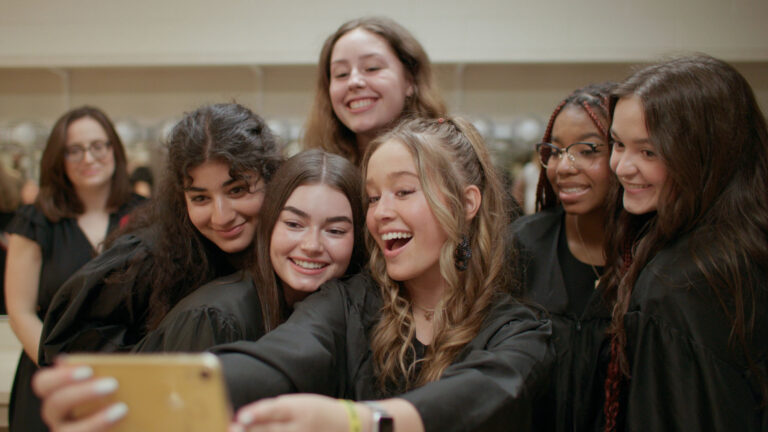Documentary filmmakers Jesse Moss and Amanda McBaine wowed audiences in 2020 with their film Boys State, following a group of high school-aged young men from across the state of Texas participating in a week-long experiment in self-governance, sponsored by the American Legion. A fascinating (and sometimes frightening) microcosm of the American political system, the film premiered at the 2020 edition of the Sundance Film Festival to rave reviews, picking up the U.S. Documentary Competition Grand Jury Prize.
Four years later, Moss and McBaine are returning to Sundance with Girls State, which examines the annual leadership program from the other side of the gender divide. Shot in 2022, just weeks before a Supreme Court decision that would overturn Roe v. Wade — the leaked draft of this decision hangs like a black cloud over the proceedings — this follow-up moves the setting from Texas to Missouri, where the Girls State and Boys State programs are being hosted simultaneously on the same campus for the first time. The overall structure is similar: students are randomly divided into different political parties and given the opportunity to create the three branches of government, run for various offices, introduce legislation, and argue cases before a panel of judges.
As with their previous film, Moss and McBaine narrow their focus to a handful of personalities, the most prominent of which is Emily, an ambitious conservative already penciling herself in for a presidential run in 2040; for now, she’d be thrilled with being Governor (the highest office at Girls State) and her campaigning begins almost the moment she steps off the bus. Emily opts for a grass roots approach, introducing herself to fellow attendees and engaging them in conversations about their ideals; she’s firmly rooted in her Christian conservative beliefs, but willing to discuss opposing viewpoints with a surprising (and refreshing) degree of civility. The biggest threat to Emily’s gubernatorial ambition is Faith, a young woman whose upbringing was steeped in right-wing ideology before she began thinking for herself and dismantling the shaky foundations upon which much of her family’s belief system was built; now she’s a fiercely outspoken liberal who was voted “most judgmental” by her high school peers, an achievement she wears like a badge of honor.
Despite their diametrically opposed political stances, Emily and Faith find themselves frustrated in equal measure by the numerous disparities between the Girls State and Boys State programs, and the unwillingness of staff and administrators to discuss those differences. It’s a recurring theme throughout the film’s brisk 96-minute runtime, and one that gradually becomes more engrossing than the Governor’s race, which Girls State (much like its predecessor) positions as the primary plot driver. A healthy amount of focus is also placed on a mock Supreme Court case, where justices will hear arguments regarding an actual Missouri law which forces women seeking an abortion to undergo counseling. Watching a panel of nine young women decide this case feels both empowering and heartbreaking, especially with the knowledge of what lies just over the horizon regarding a woman’s right to bodily autonomy.
Girls State may be treading similar ground to Moss and McBaine’s previous film, but it remains a thoroughly engrossing experience, and one that ultimately feels even more hopeful. The uglier, more cutthroat side of politics showcased in Boys State is absent here, replaced by open-minded discourse where differing opinions are welcomed and each side genuinely seeks to understand the other, rather than just beat them into submission or smear them publicly to elevate their own standing. It’s a notion that feels almost fantastical when considering the realities of the current political landscape in the US, but if young women like these can hold onto those ideals as they enter the real-world arena of politics, then maybe hope isn’t lost just yet.
Find more of our Sundance 2024 coverage at this link.

